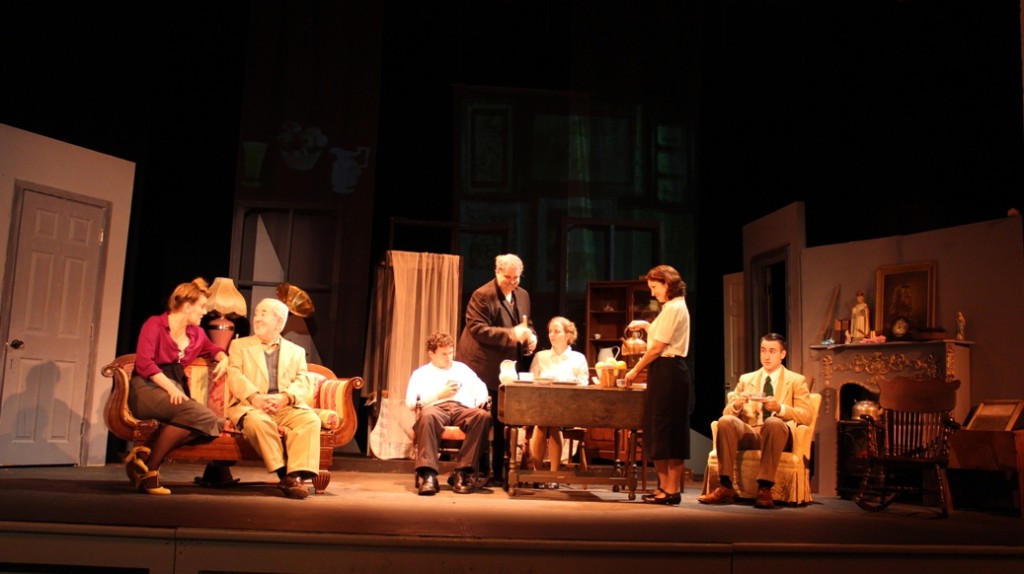
In Sean O’Casey’s JUNO AND THE PAYCOCK (1924), the proverbial “luck of the Irish” is nothing but bad luck. Following last season’s critically acclaimed production of The Shadow of a Gunman (1923), Irish Heritage Theatre continues its presentation of the playwright’s stirring “Dublin Trilogy” with its second impactful installment. The series, staged by the IHT in recognition of the centenary of Ireland’s bloody Easter Rising of 1916, will conclude in the spring with The Plough and the Stars (1926).
Set in 1922, in the midst of the Irish Civil War, the tragi-comedy takes place in the Boyles’ shabby two-room apartment in a Dublin tenement. The troubled family is plagued by unrealized hopes and unceasing misfortunes—some a result of the unstable times in which they live, but more a consequence of their own bad decisions and all-too-human flaws. Hardworking wife and mother Juno (Kirsten Quinn) provides the strength and support for her chronically unemployed and heavy-drinking husband “Captain” Jack (Ethan Lipkin), who struts around like the titular “paycock” but claims debilitating pain in his legs whenever there’s talk of a job offer. Their two adult children live with them in the cramped and deteriorating flat; idealistic daughter Mary (Gina Martino) is on strike in support of the union because “a principle is a principle,” and disabled son Johnny (Kevin Rodden) suffers from severe depression, fear, and disillusionment with both religion and the Republican cause, after losing an arm in the Die-Hards’ failed Easter rebellion. Their travails are at first funny, but turn desperate, when the promise of a surprise inheritance from a cousin and the turbulent political situation in the country lead to a series of catastrophes that shatter the already dysfunctional family.
Under Peggy Mecham’s compassionate direction, the lead actors deliver consistently powerful portrayals with believable Irish accents (dialogue coaching by Kate Danaher). Martino’s Mary is the perfect balance of naïve and flirtatious, then is devastated by the challenges she must face in her now bleak future, and Rodden brings a heart-rending mood of post-traumatic stress and melancholy to the doomed Johnny. Lipkin and Quinn are profoundly affecting as the bickering financially strapped parents with an undeniable chemistry but insurmountable problems. He is a hopeless slacker and falling-down drunk who charms with his gift of gab and laughable fantasies, but destroys with his lack of responsibility; she is everything he is not—dependable, self-sacrificing, loving, and pragmatic, worn-out from the burdens she bears, but determined to do the right thing and willing to make the hard decision she must.
The supporting cast is also strong, with standout performances by Dexter Anderson as Mary’s unreliable love interest Charlie Bentham, whose careless mistake sets off the tragic chain of events that befall the Boyles, and comic relief provided by Angelique Bouffiou and the irresistible John Cannon as tenement neighbors Maisie Madigan and Joxer Daly, both of whom enjoy hitting the bottle and singing a traditional Irish song, even if they can no longer hit the notes or remember the words. Set (by Mecham and Teddy Moseanu), projections (Alexis Mayer), costumes (Sarah Ochocki), and sound (Zack McKenna) all contribute to creating an authentic time and place for the dramatic events and a realistic representation of the characters’ reversals of fortune. [Plays & Players Theatre, 1714 Delancey Place] October 15-31, 2015; irishheritagetheatre.org.
